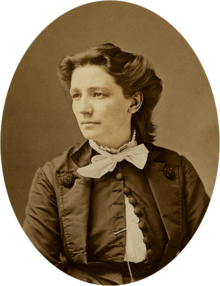A Financial Wizard!
In my previous post of Pioneering Women of Civil War America (Eighteenth Installment) about Kate Warne, I promised I’d feature another woman of Civil War times who was “A Financial Wizard!” Let me now present to you:
Victoria Claflin Woodhull (1838 – 1927)
 |
So, What Made Victoria a Financial Wizard?
She and her sister. . .
Tennessee “Tennie” Celeste Claflin (1844 – 1923)
(Later, Lady Tennessee Celeste Claflin, Viscountess of Montserrat)
. . .were the first women to become stockbrokers in the operation of their own brokerage firm on Wall Street (1870).
With their firm, they made:
A fortune for themselves on the New York Stock Exchange, as well as for other clients, such as the famous American business magnate and philanthropist, Cornelius Vanderbilt, who built his wealth in steamboats, railroads, and shipping.
Thus. . .
New York newspapers, most prominently the New York Herald, saluted the sisters as. . .
The Queens of Finance and the Bewitching Brokers!
Men’s journals, especially The Days’ Doings, unfairly vilified these two publicly minded and unchaperoned sisters as amorally sexual miscreants and prostitutes.
In 1870, Victoria and Tennie founded their own newspaper, Woodhull and Claflin’s Weekly (pictured below). Its primary purpose was to promote Victoria’s political aspirations. At its peak, it relished a nationwide circulation of 20,000 subscribers.
So. . .
What Were Victoria’s Political Accomplishments?
In 1871, she staked a claim as the first woman ever to stand before the United States Congress to address the oversight of the federal government in preventing women the right to vote as no amendment to the Constitution disqualified their sex.
First Side Bar: As luck would have it, the third annual convention of the National Woman’s Suffrage Association (NWSA) was meeting in Washington and due to begin while Victoria was addressing the House Judiciary Committee. Keen to be in attendance, Susan B. Anthony, Elizabeth Cady Stanton, and other suffragists postponed their opening to attend Victoria’s petition.
Interestingly. . .
Victoria’s appearance before Congress is depicted in the bottom image on the cover for Train to Glory (Book 1 of my Glory: A Civil War Series)!

When the federal and state governments continued to shun a woman’s right to vote, Victoria profoundly and publicly declared:
“If Congress refuses to listen to and grant what women ask, there is but one course left then to pursue. What is there left for women to do but to become the mothers of the future government?”
On to Victoria’s Other Accomplishments!
How about her being the first woman to run for president of the United States against incumbent Ulysses S. Grant for his second term in 1872? Her ticket, the “Equal Rights Party,” nominated Frederick Douglass (former slave, abolitionist, social reformer, and eloquent orator and writer) for vice-president, but he neither appeared at the convention nor acknowledged the nomination. Unfortunately, Victoria scored zero electoral votes and an unknown but trifling number of popular votes.
Second Side Bar: After Victoria’s congressional appeal for women to exorcise their right to vote, Susan B. Anthony, alongside other women, followed up in 1871 with casting a vote for Victoria and the Equal Rights Party. They were arrested and, at Susan’s trial in 1873, the judge prevented the jury from deliberating and charged it to find Susan guilty.
So much for a trial by jury guaranteed in the United States Constitution of its citizens!
Further adding insult to injury, the judge fined Susan $100.00 and other courtroom fees. Although he didn’t jail Susan when she refused to pay any of it, he denied her a chance to appeal. The judge’s actions cemented women’s servitude to men and lack of their existence under the eyes of the law. It incited suffragists deeper into action against such hypocrisy.
But back to Victoria. . .
Talk about her tenacity: In 1884 and 1892, she ran again—though obviously unsuccessfully—for U.S. president.
What in Victoria’s Background Inspired Her Calls to Action?
The explosive combination of an abusive home life (including a father who starved, beat, and sexually abused his daughters and an illiterate, illegitimate mother who resorted to blackmailing for the family’s survival), plus an adulterous first husband likely embittered Victoria to a patriarchal society and set her on her ardent path in support of women’s rights and reform.
She fought for:
Monogamous relationships and free love.
Huh? Sounds like an oxymoron!
Not so, though, by Victoria’s definition of free love: A woman’s choice to marry, divorce, and bear children without governmental interference.
And she fought against:
Prostitution even as she battled to legalize it. (So there you spiteful men’s journals of Victoria’s day which called her a prostitute)!
Per Victoria’s regard of women’s rights, how can you not love the ensuing quote by her?
“Let women issue a declaration of independence sexually, and absolutely refuse to cohabit with men until they are acknowledged as equals in everything, and the victory would be won in a single week.”
I’ll end here with the hopes that you’ve enjoyed this post and that I’ve whet your appetite to learn more about Victoria Claflin Woodhull at the following places:
Video on My Complimentary Civil War Women Website
Article Online at the National Park Service.gov: Victoria Woodhull
Book on Amazon: A Woman for President: The Story of Victoria Woodhull by Kathleen Krull
Stay Tuned for the Next Installment of Pioneering Women of Civil War America, Which Promises to Feature. . .
. . .A Pistol-Packing Powerhouse!


Pingback: Pioneering Women of Civil War America (Twentieth Installment) - Lisa Potocar ~ Author